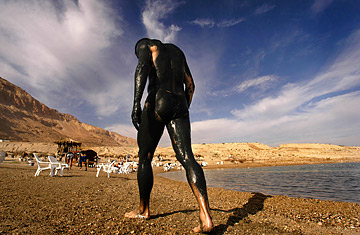
A tourist at Mineral beach near AHAVA’s factory at the Dead Sea, Israel, on Thursday November 29, 2007.
About 20 years ago, a SPA technician named Ziva Gilad spotted some mud-covered women on the shore of Israel's Dead Sea. Every day she would watch the women, whom she jokingly called gingerbread cookies, douse their skin in the rich mud and let it wash away as they floated on top of the saltwater. One day, after noticing a woman bottle up some mud to take home, Gilad had an idea for a company, and in 1988 she helped start a skin-care line that makes its products using the black mud and gray-white salt from the Dead Sea.
The tiny company, Dead Sea Laboratories, grossed nearly $1 million in its first year, most of it from boutique sales within Israel. Not bad for a 30-person start-up, but Gilad and her partners, members of four kibbutzim near the shore, wanted more, especially after seeing American tourists take products home in their suitcases. They wanted to make a mark in the U.S., a must-win market for any luxury-cosmetics company. After several years of modest success, Ahava broke through in 2000. Its secret? The company found that thriving in the glamorous world of high-end beauty often depends on the not-so-glamorous business of marketing and distribution.
Dead Sea Laboratories first tried entering the U.S. market in 1992, after the company persuaded buyers at Bloomingdale's and Saks Fifth Avenue to carry its products under the new brand name Ahava, which means love in Hebrew.
But it would take more marketing--and more money--to turn Ahava into a global brand. It got both in 2000, when an investment company called B. Gaon Holdings--owned by Israeli mogul Benjamin Gaon--noticed its potential and invested more than $10 million. "It needed someone from the investment world to give them a push," says Michael Etedgi, the Israeli-born CEO of Ahava North America. Gaon lobbied Ahava's U.S. distributor to get its products into more department stores and persuaded the company to try new product lines, including one for men, and to spend millions on magazine ads. "Big brands start in the U.S.," says Etedgi. Ahava products are now sold in 33 countries, generating nearly $150 million a year in sales, and the company has three flagship stores in the U.K., Germany and Singapore.
Of course, marketing alone isn't enough to compete against L'Oréal and Estée Lauder. Ahava had to stand out. So Gilad and her partners try to re-create the purifying experience of bathing in the Dead Sea. Unlike the smooth, delicate creams of competitors, Ahava's products--such as the creamy, pale brown "energizing body mud masks" ($18) and coarse, white "uplifting butter salts" ($22)--look and feel like the mud and salt they're made from. "Each bottle is like a mini--Dead Sea experience," Gilad says. "Other companies may have the money and the power, but we have the sea." Ahava is the only cosmetics company with the right to mine the Dead Sea for its mud and salts. (Other companies can buy them from Ahava.)
There is a drawback, however, to stressing its Israeli provenance: "Any product that says MADE IN ISRAEL will have some impact on selling in countries like Saudi Arabia and Iran," Etedgi says. That means Ahava may be missing out on the torrid growth of the luxury market in some parts of the Middle East.
In the U.S., the luxury-skin-care market is approaching saturation. The number of skin-care brands sold in department stores has more than doubled over the past 10 years. "Everyone is in the game," says Karen Grant, a senior beauty analyst for the NPD Group. Ahava hopes that luxury consumers looking for natural products will respond to the company's mineral-based product line. "It gives them an edge," Grant says.
Ahava is still a small player in the cosmetics industry, but it has big plans. Disney's investment arm agreed to acquire a 16.9% stake in the company from Gaon; Sex and the City's Kristin Davis signed up as its first celebrity endorsement last fall; and next year in New York City, Ahava plans to build a demonstration pool of concentrated saltwater, in which consumers can slather on mud and float. It's the next best thing to taking a dip in the Dead Sea yourself.